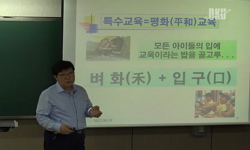한국사회에서 통일문제는 매우 중요한 과제이지만 동시에 뜨거운 감자다. 누구도 그 중요성을 부인하지 않지만 항상 논란을 불러일으킴으로써 주기적으로 반복되는 정치적논쟁과 남남갈등...
http://chineseinput.net/에서 pinyin(병음)방식으로 중국어를 변환할 수 있습니다.
변환된 중국어를 복사하여 사용하시면 됩니다.
- 中文 을 입력하시려면 zhongwen을 입력하시고 space를누르시면됩니다.
- 北京 을 입력하시려면 beijing을 입력하시고 space를 누르시면 됩니다.

특집 : 통일연구와 통합지수 -지수화의 방법론과 이론적 과제 = Inter-Korean Integration Index and Unification Studies: Methodology and Theoretical Implication
한글로보기https://www.riss.kr/link?id=A89512279
- 저자
- 발행기관
- 학술지명
- 권호사항
-
발행연도
2010
-
작성언어
Korean
-
주제어
통합 ; 통일 ; 개념화 ; 남북통합 ; 지수 ; 통합의 차원 ; 매개제도 ; 위임제도 ; integration ; unification ; conceptualization ; dimensions of integration ; delegative institution ; mediative institution
-
KDC
349.905
-
등재정보
KCI등재
-
자료형태
학술저널
-
수록면
3-34(32쪽)
- 제공처
- 소장기관
-
0
상세조회 -
0
다운로드
부가정보
국문 초록 (Abstract)
한국사회에서 통일문제는 매우 중요한 과제이지만 동시에 뜨거운 감자다. 누구도 그 중요성을 부인하지 않지만 항상 논란을 불러일으킴으로써 주기적으로 반복되는 정치적논쟁과 남남갈등의 단골메뉴가 되고 있다. 이런 상황에서 학문적 논의는 어느 정도 이념논쟁과 가치평가로부터 자유롭고 독립적일 수 있을까? 이 글은 통일논의가 학문적 차원의 독자적 담론장을 형성하기 위한 일차적 과제가 연구방법론의 확립이라는 점을 강조한다. 그런 방법론의 한 유용한 사례가 지수구성이라고 보고 남북관계와 관련한 지수개발의 노력들을 검토한다. 동시에 지수구성의 본질은 통계수치의 재구성이라는 양화 기법이 아니라, 그 지수를 통해 얻고자 하는 질적 내용, 이를 포착할 수 있는 개념적 엄밀성이 더욱 중요하다는 점을 지적하고 있다. 이를 구체적으로 확인하기 위해 서울대학교 통일평화연구소에서 개발한 남북통합지수를 사례로 하여 남북통합의 하위 영역과 상이한 차원들이 어떻게 개념화되어 있는지, 상대적 비중과 연관성에 대한 논리적 구조는 어떠한지, 그 논리적 구성에 따른 양화방식과 기법은 어떻게 이루어지고 있는지를 분석하고 있다. 이런 작업을 통해 통합지수의 개발에도 이론적 기반 및 명료한 개념화가 매우 중요하다는 점과 지수변동에 대한 이론적 해석 작업이 요구된다는 점을 밝히고 있다. 지수의 증감에 대한 정치적 해석이나 대중적 반응과는 구별되는 학계의 분석적 해석이 뒤따라야 지수의 방법론적 의의가 충분하게 드러날 수 있다고 본다. 남북통합지수의 경우 각 영역과 차원별로 상이하게 변동하는 지수의 흐름을 분석적으로 읽어내려는 학문적 자세와 노력이 절대적으로 필요하다. 그러한 분석적 노력에 의해서만 학계의 독자적 담론이 가능하고 궁극적으로 실천적 지혜에도 기여할 수 있으리라는 것이 이 글의 주장이다.
다국어 초록 (Multilingual Abstract)
This paper aims at examining the possibility of scientific unification studies by exploring the methodological difficulties of the academic research on the inter-Korean issues. Since the issue of unification and North-Korea related questions are so po...
This paper aims at examining the possibility of scientific unification studies by exploring the methodological difficulties of the academic research on the inter-Korean issues. Since the issue of unification and North-Korea related questions are so politically complex that value-free discussion in the academia seems to be very difficult. Nevertheless, it is necessary to build a methodologically disciplined concepts and discourses among academicians in order to distinguish opinions of scientific researchers from those of politicians and ordinary citizens. Developing index is a useful method for social scientist to catch complex reality. This paper tries to show methodological usefulness, theoretical task and practical implications in unification studies by examining the Inter- Korean Integration Index, which has been designed by IPUS, Seoul National University since 2007. The main arguments are; an index is not a quantitative technique but a comprehensive theoretical conceptualization, a clear conceptualization on the research is necessary for developing index, philosophical and theoretical implication should be examined in order to develop appropriate index structure. Inter-Korean Integration Index helps us to figure out; three sectors and dimensions of inter-Korean integration, different speed and stages of sub-level`s integration, relative importance among diverse sectors and dimensions. Finally some methodological limits and theoretical problems of Inter-Korean Integration Index are discussed.
동일학술지(권/호) 다른 논문
-
- 서울대학교 통일평화연구원
- 은기수 ( Ki Soo Eun )
- 2010
- KCI등재
-
특집 : 고학력 북한이탈주민이 인지하는 차별과 직업계층 변화에 대한 인식
- 서울대학교 통일평화연구원
- 김화순 ( Wha Soon Kim )
- 2010
- KCI등재
-
연구논문 : 사회주의 체제전환과 북한 변화 -비교사회주의 관점에서
- 서울대학교 통일평화연구원
- 김근식 ( Keun Sik Kim )
- 2010
- KCI등재
-
연구논문 : 남남갈등의 연계성 - 대북정책에 관한 조선일보-한겨레신문 태도 간 연계성 및 대북정책-대중정책-대미정책 태도 차이 간 연계성을 중심으로
- 서울대학교 통일평화연구원
- 김재한 ( Chae Han Kim )
- 2010
- KCI등재




 KISS
KISS







